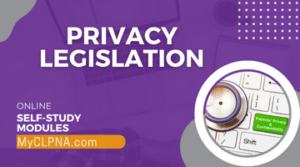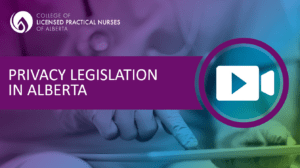Privacy Legislation and LPN Practice
This article provides general advice regarding privacy legislation and LPN practice. It is not a substitute for legal consultation.
In 2023, the College of Licensed Practical Nurses of Alberta (CLPNA) received 19 complaints related to breaches of privacy and confidentiality. This represents 9% of our total complaints received last year.
As a Licensed Practical Nurse (LPN), you have a responsibility to protect your clients’ privacy. This article will give you more tools to understand how you can meet this responsibility.
Register for Our Webinar on Privacy Legislation in Alberta
LPNs have a professional and ethical responsibility to practice within relevant privacy and confidentiality laws. We offer a webinar, Privacy Legislation in Alberta, to help you understand the laws that may impact practice.
What Is Privacy?
Privacy is a right that we all have. Having privacy means that clients can make decisions about how their personal information is shared.
What Is Personal Information?
Personal information is anything that can identify an individual. A client may be identified only by one piece of information, or by two or more pieces of information taken together.
For example, personal information can be a client’s name in combination with information like:
- their driver’s license number,
- their physical or digital (email) address, or
- their birth date.
This is only a few examples. Just remember: a lot of data can be considered personal information, and information should only be shared under certain circumstances.
Health Information
Healthcare professionals also have a duty to protect their clients’ personal health information. Personal health information includes anything collected during the course of a therapeutic relationship, including diagnosis. It can be provided verbally, electronically, or in writing.
What Is a Breach of Privacy?
Healthcare professionals have an ethical duty to protect the confidentiality of the information that they can access or that has been disclosed to them. You can only access, use, or disclose information when you have a legitimate reason.
Breaches of privacy happen when information is shared without a legitimate reason. A privacy breach can be deliberate, but it can also be unintentional. For example, mixing up patient charts is a privacy breach.
How Do You Know What Your Responsibilities Are?
To understand when a regulated professional can share personal information, you should look at what’s written in the privacy laws as well as the employer’s specific requirements.
Privacy Legislation in Alberta
There are three acts that commonly regulate privacy in Alberta. They are:
- Health Information Act,
- Personal Information Protection Act, and
- Freedom of Information and Protection of Privacy Act.
Which privacy legislation applies to you depends on your practice setting and the type of information being handled. You can learn more by reading our practice guideline.
Note that, if you work for a federal body, the privacy legislation that applies to you may be different.



